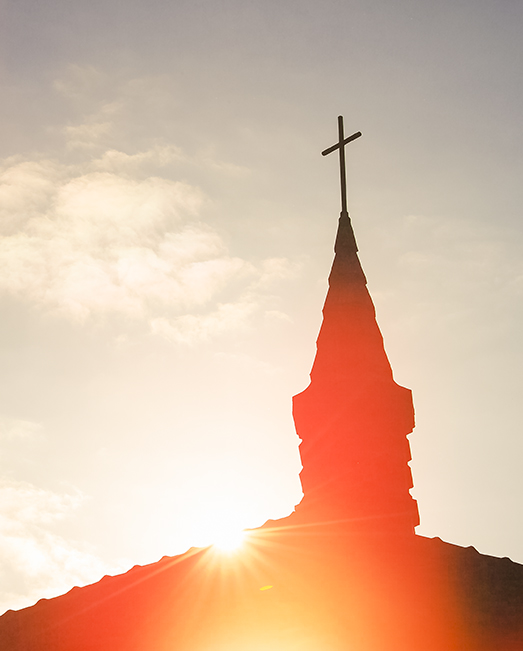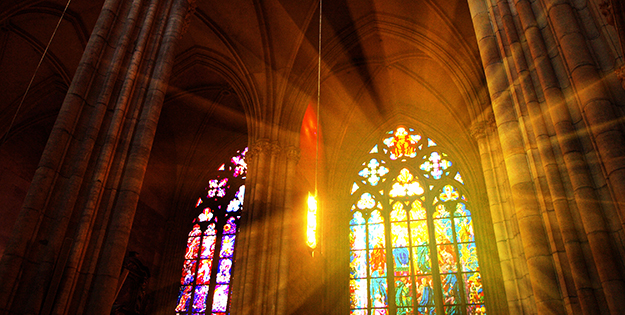Global
Copyright@ Australian Catholic University 1998-2026 | ABN 15 050 192 660 CRICOS registered provider: 00004G | PRV12008
Copyright@ Australian Catholic University 1998-2026 | ABN 15 050 192 660 CRICOS registered provider: 00004G | PRV12008

A Catholic university might be the last place one expects to find serious study of atheism. But at the Institute for Religion and Critical Inquiry (IRCI) at ACU, atheism is one of the major topics under examination.
Atheism and Christianity: Moving Past Polemic is an ACU-led project which brings together an international and inter-disciplinary team of philosophers and theologians. The researchers – from ACU, Yale and KU Leuven – are exploring what atheism and Christianity have in common, and what they can learn from one another.
The project’s leader, ACU philosopher and theologian Dr David Newheiser, said there was a profound anxiety about the place of religion in contemporary society, partly prompted by migration and the resulting changing religious make-up of western societies.
But why does this anxiety matter? Dr Newheiser says, “There is a risk that religious and secular people will become hardened in their positions and see the other as a threat to their freedom.”
Religion remains an important force in places like Indonesia and the United States. However in Australia, some Christians now claim they are losing religious freedom to a secular society.
United States Attorney-General Jeff Sessions has announced a religious liberty taskforce in his department to counter what he calls the “dangerous movement” of secularism, “challenging and eroding our great tradition of religious freedom”.
Dr Newheiser believes navigating the relationship between how religion influences values, and the secularism of the political sphere, is an important contemporary challenge.
“What often gets missed in the polarised conversation that dominates the public discussion of religion is that there are complicated relationships between religion and the secular,” said Dr Newheiser. “Their histories intertwine. Appreciating their surprising affinities allows for much more open and complicated conversation and enables each side to learn from the other.”
Dr Newhiser went on to explain how prominent atheists such as Richard Dawkins and the late Christopher Hitchens represented only one variety of atheism and, like fundamentalist Christians, they tended to get a lot of air time.
“Atheism is actually much deeper than a lot of the discussion of atheism today would suggest. Many of the well-known proponents of atheism today – the so-called ‘new Atheists’ – focus on whether a Divine being exists and try to tally up the evidence for or against.

“But older atheist thinkers, like David Hume, Ludwig Feuerbach and Karl Marx, recognised that religion isn’t just a matter of believing certain propositions about the world. They focused on the way in which religion influences ethics, politics, and even aesthetics.”
Early modern critics of Christianity, such as Hobbes and Voltaire, are often seen as the forbears of contemporary atheism. But their writings draw heavily on moral sensibilities that can be traced to Christian ideas. Contemporary atheism often emphasises the freedom of the individual to pursue truth, a concept which has its roots in the Protestant Reformation.
“That’s not to say early atheists were secretly Christian,” said Dr Newheiser. “They disidentified with the religion around them, and that mattered. But it does mean they were drawing on a heritage that allowed points of intersection and tension with Christianity. They are often drawing on some strands of Christianity in order to criticise others.”
On the flip side, some Christian thinkers use critiques developed by atheists to advance their ideas. Liberation theologian Gustavo Gutiérrez cited Karl Marx’s criticism of religion in his work, which argues that Christians have sometimes hindered the cause of economic and social justice.
Dr Newheiser hopes a more complex understanding of both Christianity and atheism will counter a growing impasse about the role of religion in public life.
“On the one hand, there’s an idea that religion should simply be excluded from the public sphere. On the other, there’s a view – which I worry about – that Western society is founded upon Christianity and so we must cling to this heritage if we are going to have any foundation for morality.
“I think these two opposing views are actually wrong for the same reason. They try to make a single principle, whether that’s secularism or Christianity, dominant. I think that’s not how societies work and it’s not how Christianity works. Both of them are too complex and multilayered to allow any single perspective to serve as their foundation.
“I want to open the possibility that religious traditions can contribute to hot button issues like abortion or same sex marriage without trying to impose a theocratic authority on the public sphere.”
Dr Newheiser said a key element of the project was the capacity of both parties to acknowledge the uncertainty surrounding the big questions of religion. There was a strong tradition of self-criticism within Christianity, but it was often drowned out by polemical discourse.
“The loudest voices are claiming a sort of certainty that on the basis of their traditions they should not claim. It’s very appealing in some ways. People want to have certainty, it quiets anxieties. But there is a very deep tradition that is informed by the knowledge that we need to hold on to uncertainty.”
Dr Newheiser is interested in negative theology, a form of theological thinking which says that human knowledge of God is always imperfect. Early Christian theologians developed this way of thinking in conversation with biblical traditions and ancient Greek philosophy. Elements of it also exist in Judaism and Islam.
But he said some contemporary Christians attempt to exclude the capacity for doubt within theology.
“It makes for a neat picture if the role of religious authority is to tell people what to do, and with the rise of evangelical Christianity that’s what gets the attention. But I would argue that living with uncertainty is essential.”
In fact, Dr Newheiser believes that Christians who claim absolute certainty are profoundly un-Christian.
“Anything that Christians say they need to hold loosely. Agnosticism is the precondition of faith. Christians who claim that they know with absolute certainty deny the possibility of faith.”
Dr David Newheiser works in the areas of classic Christian thought and contemporary continental philosophy. He is a researcher in ACU’s Institute for Religion and Critical Inquiry.
Copyright@ Australian Catholic University 1998-2026 | ABN 15 050 192 660 CRICOS registered provider: 00004G | PRV12008